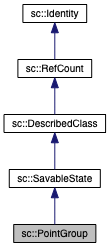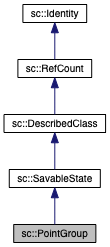The PointGroup class is really a place holder for a CharacterTable. More...
#include <pointgrp.h>


Public Member Functions | |
| PointGroup (const char *) | |
| This constructor takes a string containing the Schoenflies symbol of the point group as its only argument. | |
| PointGroup (const char *, SymmetryOperation &) | |
| Like the above, but this constructor also takes a frame of reference as an argument. | |
| PointGroup (const char *, SymmetryOperation &, const SCVector3 &) | |
| Like the above, but this constructor also takes a point of origin as an argument. | |
| PointGroup (const Ref< KeyVal > &) | |
| The PointGroup KeyVal constructor looks for three keywords: symmetry, symmetry_frame, and origin. More... | |
| PointGroup (StateIn &) | |
| PointGroup (const PointGroup &) | |
| PointGroup (const Ref< PointGroup > &) | |
| PointGroup & | operator= (const PointGroup &) |
| int | equiv (const Ref< PointGroup > &, double tol=1.0e-6) const |
| Returns 1 if the point groups are equivalent, 0 otherwise. | |
| CharacterTable | char_table () const |
| Returns the CharacterTable for this point group. | |
| const char * | symbol () const |
| Returns the Schoenflies symbol for this point group. | |
| SymmetryOperation & | symm_frame () |
| Returns the frame of reference for this point group. | |
| const SymmetryOperation & | symm_frame () const |
| A const version of the above. | |
| SCVector3 & | origin () |
| Returns the origin of the symmetry frame. | |
| const SCVector3 & | origin () const |
| void | set_symbol (const char *) |
| Sets (or resets) the Schoenflies symbol. | |
| void | save_data_state (StateOut &so) |
| Save the base classes (with save_data_state) and the members in the same order that the StateIn CTOR initializes them. More... | |
| void | print (std::ostream &o=ExEnv::out0()) const |
| Print the object. | |
 Public Member Functions inherited from sc::SavableState Public Member Functions inherited from sc::SavableState | |
| SavableState & | operator= (const SavableState &) |
| void | save_state (StateOut &) |
| Save the state of the object as specified by the StateOut object. More... | |
| void | save_object_state (StateOut &) |
| This can be used for saving state when the exact type of the object is known for both the save and the restore. More... | |
| virtual void | save_vbase_state (StateOut &) |
| Save the virtual bases for the object. More... | |
 Public Member Functions inherited from sc::DescribedClass Public Member Functions inherited from sc::DescribedClass | |
| DescribedClass (const DescribedClass &) | |
| DescribedClass & | operator= (const DescribedClass &) |
| ClassDesc * | class_desc () const throw () |
| This returns the unique pointer to the ClassDesc corresponding to the given type_info object. More... | |
| const char * | class_name () const |
| Return the name of the object's exact type. | |
| int | class_version () const |
| Return the version of the class. | |
 Public Member Functions inherited from sc::RefCount Public Member Functions inherited from sc::RefCount | |
| int | lock_ptr () const |
| Lock this object. | |
| int | unlock_ptr () const |
| Unlock this object. | |
| void | use_locks (bool inVal) |
| start and stop using locks on this object | |
| refcount_t | nreference () const |
| Return the reference count. | |
| refcount_t | reference () |
| Increment the reference count and return the new count. | |
| refcount_t | dereference () |
| Decrement the reference count and return the new count. | |
| int | managed () const |
| void | unmanage () |
| Turn off the reference counting mechanism for this object. More... | |
| int | managed () const |
| Return 1 if the object is managed. Otherwise return 0. | |
 Public Member Functions inherited from sc::Identity Public Member Functions inherited from sc::Identity | |
| Identifier | identifier () |
| Return the Identifier for this argument. More... | |
Additional Inherited Members | |
 Static Public Member Functions inherited from sc::SavableState Static Public Member Functions inherited from sc::SavableState | |
| static void | save_state (SavableState *s, StateOut &) |
| static SavableState * | restore_state (StateIn &si) |
| Restores objects saved with save_state. More... | |
| static SavableState * | key_restore_state (StateIn &si, const char *keyword) |
| Like restore_state, but keyword is used to override values while restoring. | |
| static SavableState * | dir_restore_state (StateIn &si, const char *objectname, const char *keyword=0) |
 Protected Member Functions inherited from sc::SavableState Protected Member Functions inherited from sc::SavableState | |
| SavableState (const SavableState &) | |
| SavableState (StateIn &) | |
| Each derived class StateIn CTOR handles the restore corresponding to calling save_object_state, save_vbase_state, and save_data_state listed above. More... | |
 Protected Member Functions inherited from sc::RefCount Protected Member Functions inherited from sc::RefCount | |
| RefCount (const RefCount &) | |
| RefCount & | operator= (const RefCount &) |
Detailed Description
The PointGroup class is really a place holder for a CharacterTable.
It contains a string representation of the Schoenflies symbol of a point group, a frame of reference for the symmetry operation transformation matrices, and a point of origin. The origin is not respected by the symmetry operations, so if you want to use a point group with a nonzero origin, first translate all your coordinates to the origin and then set the origin to zero.
Constructor & Destructor Documentation
◆ PointGroup()
The PointGroup KeyVal constructor looks for three keywords: symmetry, symmetry_frame, and origin.
symmetry is a string containing the Schoenflies symbol of the point group. origin is an array of doubles which gives the x, y, and z coordinates of the origin of the symmetry frame. symmetry_frame is a 3 by 3 array of arrays of doubles which specify the principal axes for the transformation matrices as a unitary rotation.
For example, a simple input which will use the default origin and symmetry_frame ((0,0,0) and the unit matrix, respectively), might look like this:
pointgrp<PointGroup>: ( symmetry = "c2v" )
By default, the principal rotation axis is taken to be the z axis. If you already have a set of coordinates which assume that the rotation axis is the x axis, then you'll have to rotate your frame of reference with symmetry_frame:
pointgrp<PointGroup>: (
symmetry = "c2v"
symmetry_frame = [
[ 0 0 1 ]
[ 0 1 0 ]
[ 1 0 0 ]
]
)
Member Function Documentation
◆ save_data_state()
|
virtual |
Save the base classes (with save_data_state) and the members in the same order that the StateIn CTOR initializes them.
This must be implemented by the derived class if the class has data.
Reimplemented from sc::SavableState.
The documentation for this class was generated from the following file: